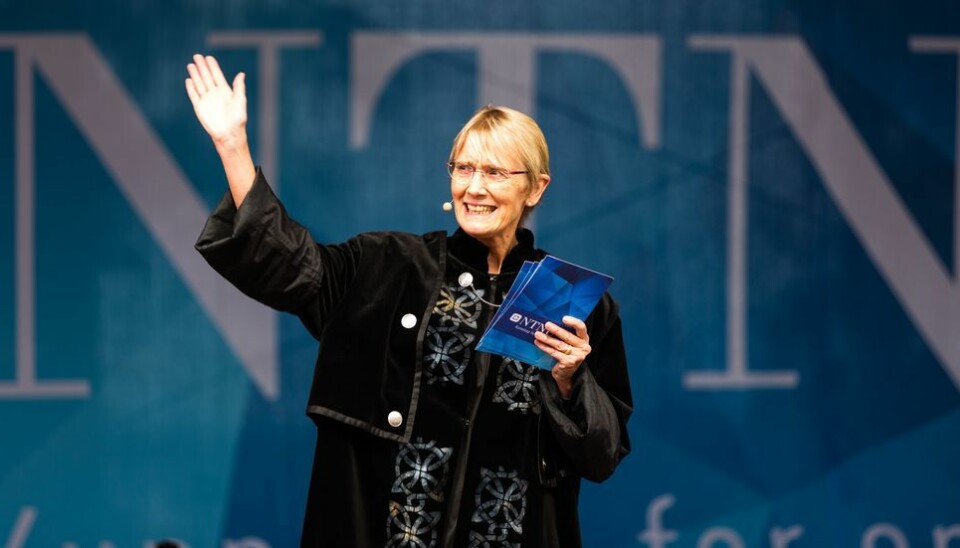Ytring:
Studentene må tenke over hvordan de skal ønske nye studenter velkommen
PhD-student Sara-Maria Kauppi har i et leserinnlegg i Universitetsavisa, under den treffende overskriften «The unwelcoming welcoming event», problematisert opptaksritualene enkelte linjeforeninger fremdeles bruker ved starten av et nytt studieår.
- As rector, I am 100 per cent in agreement that NTNU should both be, and be perceived as, inclusive, acting NTNU-rector Anne Borg writes in her response to Sara-Maria Kauppi.
Espen Halvorsen Bjørgan
Som rektor er jeg hundre prosent enig i at NTNU både skal være og fremstå som inkluderende. Dette har jeg også hatt en jevnlig dialog med linjeforeningene om, seinest i forrige uke da jeg snakket med mer enn 70 representanter fra linjeforeningene våre i møter på Dragvoll og Gløshaugen.
Les Sara-Maria Kauppis innlegg her
Linjeforeningene er en av bærebjelkene i det gode studiemiljøet som NTNU er kjent for, og legger ned en formidabel innsats for sine medstudenter. Mange av dem forvalter langvarige tradisjoner, alle forvalter en kultur. Med det følger et stort ansvar. Jeg ønsker derfor først og fremst at de selv reflekterer over om alle disse ritualene virkelig står for verdier de ønsker å identifisere seg med, og om det er denne måten de vil ønske nye studenter velkommen i 2020.
Uansett mener jeg det er bedre at ritualer og seremonier foregår på campus, enn at de er spredt utover byen. Det betyr imidlertid også at disse aktivitetene er med og påvirker NTNUs omdømme – et omdømme som studentene både har egeninteresse i, og medansvar for.
Jeg er glad for at Studenttinget allerede har svart i UA, og regner med at dialogen også fortsetter mellom de ulike studentorganene. Samtidig oppfordrer jeg både dekaner og instituttledere til å ha jevnlig dialog med linjeforeningene, som er så viktige organisasjoner for en stor andel av studentene våre. En dialog som bør skje gjennom hele året, og omfatte mye mer enn aktivitetene ved semesterstart.
Til slutt vil jeg takke Sara- Maria Kauppi for engasjementet og et reflektert innspill i en viktig diskusjon ved NTNU.
**
NTNU must be welcoming to all
In a recent reader commentary in Universitetsavisa aptly titled "The unwelcoming welcoming event", PhD candidate Sara-Maria Kauppi has called into question the admission rituals that some study associations still conduct at the start of a new academic year.
As rector, I am 100 per cent in agreement that NTNU should both be, and be perceived as, inclusive. I have also had regular conversations with NTNU’s study associations about precisely this issue, most recently last week when I spoke with more than 70 representatives from the university’s study associations in meetings at Dragvoll and Gløshaugen.
NTNU’s study associations are an important pillar for the strong study environment our university is known for, and these groups work extremely hard on behalf of their fellow students. Many of them oversee long-standing traditions, and all of them oversee a culture. With this comes a huge responsibility. Thus, I would first and foremost ask the study associations themselves to reflect on whether their rituals really represent the values they want to be identified with — and whether this is really how they want to welcome new students in 2020.
Regardless of how associations choose to welcome students, I believe it is better that these rituals and ceremonies take place on campus, rather than be spread throughout the city. In any event, it is important for the study associations and students in general to keep in mind that these activities contribute to and influence NTNU's reputation — a reputation for which students have both a co-responsibility and an interest.
I am glad that the Student Parliament has already responded to Sara-Maria Kauppi’s commentary in Universitetsavisa, and I expect this conversation to continue between the various student bodies. At the same time, I encourage both deans and department heads to have regular discussions with the study associations, which are such important organizations for a large proportion of our students. This is a conversation that should take place throughout the year, and should encompass much more than the activities and rituals held at the start of the semester.
Finally, I would like to thank Sara-Maria Kauppi for her engagement in this issue, and for her thoughtful input to an important discussion at NTNU.

























